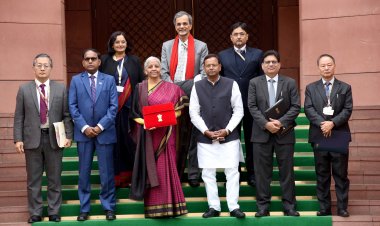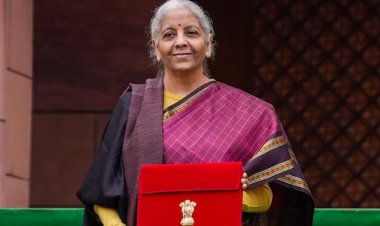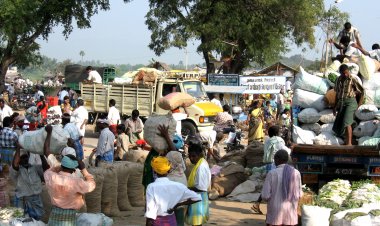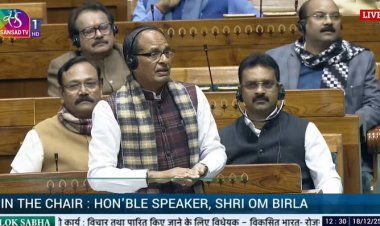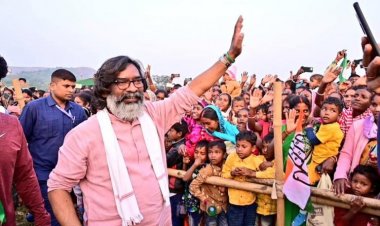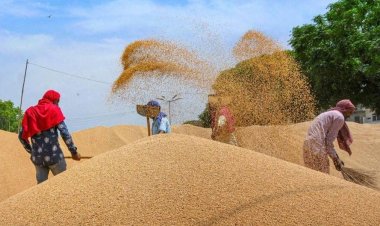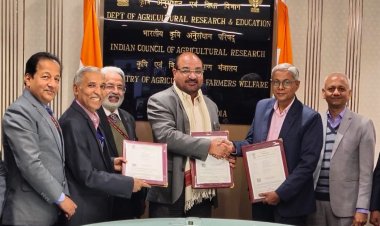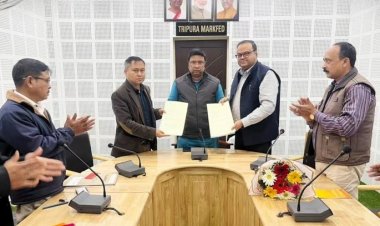Former Prime Minister Chaudhary Charan Singh is one of the few leaders whose politics was centered around farmers. He had done many works in the interest of the farmers. He was the only leader who had prepared the ground for creating a middle class of peasants. Three laws implemented by him in Uttar Pradesh proved to be radical changes in the situation of agriculture and farmers in the state.
He understood the pulse of rural India well, so he advocated 50 per cent reservation in government jobs for children from peasant families to bridge the gap between the urban class and the village and peasantry. He also wrote a paper on it. Acknowledging changes over time, he also amended this paper of 1939 in 1960 to 60 per cent reservation for peasant families and 75 per cent reservation for landless families dependent on agriculture.
The farming middle class that he was talking about is in crisis at the moment. We saw a glimpse of this in the form of the peasant movement on the borders of Delhi in 2020-21. Its sequel could be seen in the next few days as the reality of farmers caught in a cycle of declining incomes and rising aspirations is before everyone's eyes. Leaders like Chaudhary Charan Singh, who had the ability and thinking to change their lives from the fourth decade to the ninth decade of the last century, were not only in politics but were in governments and had the ability to make and implement laws for them.
Ironically, today there is no politician or farmer leader to fill the void created by him.
Paul R Brass’s two-volume book on the political life of Chaudhary Charan Singh is not only an important document, but it brings to light everything from his working style and his correspondence between politicians to the decisions of government departments. Advocating reservation, Singh says there are officials in the agriculture department who cannot distinguish between barley and wheat plants. These people do not know which crops need irrigation when.
He wrote a paper on March 21, 1947, entitled Why Farmers' Children Should Get 60 Percent Reservation in Jobs. In it, he clearly stated that sons and dependents of farmers should be given reservation in government jobs and publicly funded educational institutions. It does not mention any caste.
If we look at it now, castes like Jats, Marathas, Kapu and Patels, which are dependent on agriculture, keep agitating for reservation as their economic and social status has been weakened considerably compared to the urban class. It is different that a large section of the castes who benefited from the laws he enacted in Uttar Pradesh got reservation from the recommendations of the Mandal Commission implemented in August 1990.
Chaudhary Charan Singh was the Home Minister in the Morarji Desai government that constituted the Backward Classes Commission in January, 1979 under the chairmanship of BP Mandal. It was on the basis of the report of this commission, that the provision of 27 per cent caste-based reservation for Other Backward Classes (OBCs) was implemented in August, 1990. SCs and STs already get 22.5 per cent reservation.
Citing a 1961 survey, he said the share of people from peasant backgrounds in the Indian Administrative Service (IAS) was only 11.5 per cent, while the share of children of government employees was 45.8 per cent. In this regard, he said that the children of farmers should get 60 per cent reservation. Also, children of people who have availed government jobs should be considered ineligible for government jobs.
He argued that this would increase the efficiency of government departments as farmers’ children are better at work and also able to take better decisions in difficult situations. His hands will not tremble in taking a tough decision like an official coming from an urban background. He will prove better than the tehsildar who fixes a dozen dates for the hearing of a case of compensation of Rs. 100.
In fact, he was of strong view about the difference between villages and cities. He believed that the real difference was between the village and the city. Urban people think of villagers as rustic and ignorant. This is the case when in 1950-51, the share of agriculture in the gross domestic product (GDP) of the country was 54 per cent and 70 per cent of the people of the country depended on agriculture for employment. Reservation is necessary to close this gap, as government jobs are currently occupied by urbanites. Farmers and villagers are suffering from poverty due to lack of opportunity. He also made it clear that no one should be asked about his caste when entering government jobs and educational institutions.
The first proposal for reservation for children of peasants was put before the Executive Committee of the Uttar Pradesh (then United Provinces) Congress Legislature Party in April 1939, calling for 50 per cent reservation. When he was criticized for his opinion of excluding landless people from the reservation, he said that he had no objection to that and that the reservation should be increased to 75 per cent.
According to the 1951 census, the share of these people engaged in agricultural activities was 28.1 per cent. He never tried to show himself as a Jat of his caste, but worked for all the peasants. This is why he formed an alliance of Muslims, Ahirs, Jats, Gurjars and Rajputs (Majgars) as a political force.
Talking about the three laws of Chaudhary Charan Singh, the first is the Uttar Pradesh Zamindari Abolition and Land Reforms Act (ZALR) 1950, which took land from the zamindars and gave its ownership to the sharecroppers who cultivated it. This law of 1950 changed the fate of the farmers of Uttar Pradesh. All the efforts of the landlords failed and the cultivators became the owners of the land. By this law the system of landlords paying taxes to the government for cultivation was abolished for ever.
While the farmers became the owners of the land with ancestral rights, the Yadavs, Kurmis, Gurjars, Muslims and all backward castes benefited the most from this law.
The UP Consolidation of Holdings Act, 1953 was the second law. Under this law he wanted those who got land after the old system was changed to become more efficient farmers. For him, farmers' holdings in different places were brought together so that his entire holdings were in one place. This will increase his productivity and efficiency. In 1976-77, out of 146 lakh hectares of land in Uttar Pradesh, 142 lakh hectares of land had been demarcated under the Act.
Then the third law, the UP Imposition of Ceiling on Land Holdings Act, 1960, followed. Under this law, a limit of 40 acres of better quality was fixed for a family of five persons. He believed that a minimum to maximum size of a farmer's holding of two and a half acres to 27.5 acres was ideal. In it he can farm himself with his family and also use productivity enhancing machines including tractors.
With these laws of Chaudhary Charan Singh, the farmers benefited from the Green Revolution. Provisions like higher productivity crop varieties, availability of fertilizers, government procurement under the MSP system raised a large middle class of farmers.
This feat, achieved in early four decades ago, has now become history. Stagnating yield in areas where the green revolution has worked, shrinking holdings as land is fragmented, rising input costs and abnormal weather changes have changed the situation. The rural India, the farmer and his family are in crisis. A national level farmer leader with the vision and ability to lead policy changes to get them out of this crisis no longer exists.
As a result, socio-economic inequality between people dependent on agriculture and those working in other sectors of the economy has increased rapidly. As a result, thanks to the steps and laws of leaders like Chaudhary Charan Singh and Sir Chotu Ram, the farmers are moving towards the movement amidst these struggles. But the path of agitation also only goes to issues like MSP. There is no big holistic solution in it that can relieve the farmers from this crisis.
The government's announcement of Bharat Ratna to Chaudhary Charan Singh has once again given an opportunity to understand his policies and steps and review the farmers' crisis.
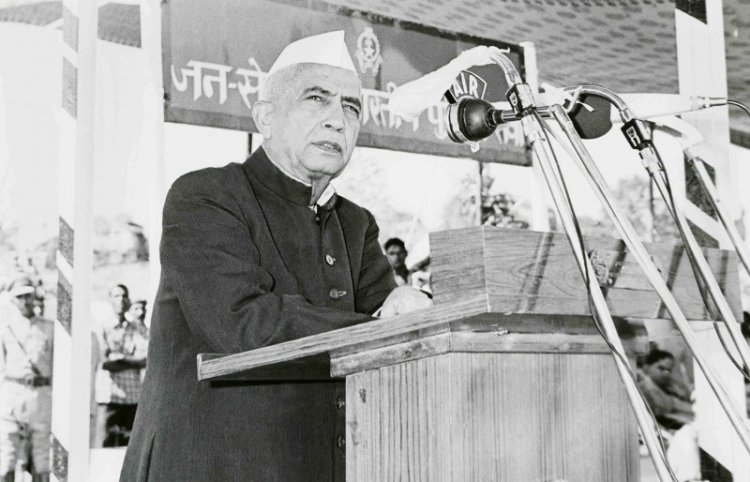



 Join the RuralVoice whatsapp group
Join the RuralVoice whatsapp group


















